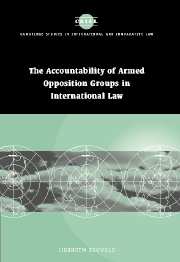Book contents
- Frontmatter
- Contents
- Table of treaties and declarations
- Table of cases
- Table of other documents
- List of abbreviations
- Introduction
- PART 1 THE NORMATIVE GAP
- PART 2 THE ACCOUNTABILITY GAP
- 3 Accountability of group leaders
- 4 Accountability of armed opposition groups as such
- 5 Accountability of the state for acts of armed opposition groups
- 6 The quest for accountability
- Conclusion
- Bibliography
- Index
- CAMBRIDGE STUDIES IN INTERNATIONAL AND COMPARATIVE LAW
6 - The quest for accountability
Published online by Cambridge University Press: 28 July 2009
- Frontmatter
- Contents
- Table of treaties and declarations
- Table of cases
- Table of other documents
- List of abbreviations
- Introduction
- PART 1 THE NORMATIVE GAP
- PART 2 THE ACCOUNTABILITY GAP
- 3 Accountability of group leaders
- 4 Accountability of armed opposition groups as such
- 5 Accountability of the state for acts of armed opposition groups
- 6 The quest for accountability
- Conclusion
- Bibliography
- Index
- CAMBRIDGE STUDIES IN INTERNATIONAL AND COMPARATIVE LAW
Summary
When armed opposition groups involved in internal conflict commit acts injuring civilians, different actors may be held accountable under international law for these acts or for failure to prevent or repress them. This conclusion follows from the practice of international bodies. These actors are: leaders and members of armed opposition groups, armed opposition groups themselves, and the territorial state. The accountability of these three actors is distinct in kind. The question remains how to integrate them.
The accountability of armed opposition groups as such would be the most appropriate answer to the abuses committed by these groups. Grave difficulties, however, centre on this kind of accountability. Accountability of individual leaders and the state, in contrast, are less problematic. Indeed, the accountability of the state is firmly rooted in international law. More recently, the trend of accountability of individuals has entered the body of international law, and has been constantly supported in practice. Similar developments have, however, not taken place with regard to armed opposition groups – their accountability being a grey area in international law.
Group versus individual accountability
In this decade, international law has developed towards criminalization of acts committed by individuals in internal armed conflict, including leaders of armed opposition groups. This development is of great importance. It means that armed opposition groups can be regulated not only through the state and armed opposition groups as an organization, but also through their individual leaders.
- Type
- Chapter
- Information
- Accountability of Armed Opposition Groups in International Law , pp. 220 - 228Publisher: Cambridge University PressPrint publication year: 2002

